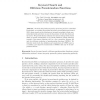54 search results - page 4 / 11 » Oblivious Transfer Based on Physical Unclonable Functions |
CHES
2010
Springer
13 years 8 months ago
2010
Springer
We propose a new technique called stable-PUF-marking as an alternative to error correction to get reproducible (i.e. stable) outputs from physical unclonable functions (PUF). The ...
CTRSA
2006
Springer
13 years 11 months ago
2006
Springer
RFID-tags are becoming very popular tools for identification of products. As they have a small microchip on board, they offer functionality that can be used for security purposes. ...
TCC
2005
Springer
14 years 26 days ago
2005
Springer
We study the problem of privacy-preserving access to a database. Particularly, we consider the problem of privacy-preserving keyword search (KS), where records in the database are ...
CRYPTO
2007
Springer
13 years 11 months ago
2007
Springer
Oblivious transfer (OT) is an essential building block for secure multiparty computation when there is no honest majority. In this setting, current protocols for n 3 parties requ...
CASES
2010
ACM
13 years 5 months ago
2010
ACM
Physical Unclonable Functions (PUFs) based on Ring Oscillators (ROs) are a promising primitive for FPGA security. However, the quality of their implementation depends on several d...

